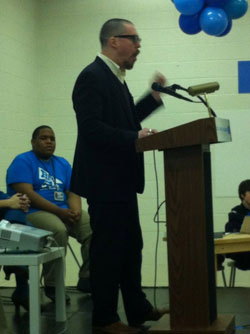Co-executive directors of the Digital Harbor Foundation, Andrew Coy (left) and Shelly Blake-Plock, flank director of the Digital Harbor Tech Center, Rose Burt.
Energy was palpable at the grand opening of the Digital Harbor Tech Center in Federal Hill on Thursday night as Shelly Blake-Plock, co-executive director of the Digital Harbor Foundation, took the stage.
Speaking with the conviction of a preacher, Blake-Plock pontificated about the need to create a new ecosystem of education in Baltimore, one where students will be measured not by their relative prowess on bubble-tests, but rather by their entrepreneurial thinking inside the classroom.

“Let us make Baltimore a shining example of what happens when education, innovation and civic industry come together,” Blake-Plock said as a room of more than 200 people applauded their approval.
The new tech center is the physical embodiment of the mission of Digital Harbor Foundation, one the nearly one-year-old nonprofit has trumpeted throughout Baltimore city: it is high time for this city’s public schools to provide students with real-world tech training in a move to make learning more symbiotic with the STEM jobs that are taking over chunks of the U.S. economy.
And the tech center itself is attached to Digital Harbor High School, which pays the insurance on the building. As Technically Baltimore reported, the “tech center occupies the same space where the South Baltimore Rec Center was located, at the corner of Cross and Light streets. It’s an initiative the foundation calls ‘Rec2Tech,‘ a response to the city’s budgetary woes that required the closure of four recreation centers in August and the transfer of operations at several other recreation centers to city schools.”
Students in grades K-12 will take part in “after-school digital literacy, tech workforce development, and innovation programs,” according to the Digital Harbor Foundation. The new tech center is also a Maker Corps host site in the pilot year of the Maker Education Initiative, which will train people ages 18 to 22 in digital fabrication during spring 2013 before placing them in paid summer internships.
While liberal arts-lovers might bemoan the Digital Harbor Tech Center as yet another attempt to program kids along a specific, linear pathway to success, Blake-Plock talked about the tech center’s ability to “contribute the material value” to the context of the times in which we live. His speech was one about stressing the need for schools to encourage iteration, adaptation and change, and to push students toward trying, failing and trying again—the credo of sorts for countless entrepreneurs—until they discover their own passions and worth.
Watch part of Shelly Blake-Plock’s address at the Digital Harbor Tech Center’s opening:
[youtube http://www.youtube.com/watch?v=OkB-Z6AAqdc&w=550&h=309]
Learning, he said, should be about “linking the way we educate our kids to the way we innovate our ideas.”
Certainly the Digital Harbor Foundation has already made strides: a summer-long tech training curriculum for 10 of this city’s school teachers, a “BmorePipeline” to help high school students meet leaders in this city’s tech industry on their way to getting internships, a STEM Engine web development program through which high school students make money building websites for clients, and pocket the money in scholarship accounts.
The opening of the tech center is yet another step.
Does it sound a bit farfetched, this notion of drastically altering the way in which Baltimore city’s public school students have been taught?
Probably. But, as Blake-Plock said before leaving the stage: “Now is the time to do the impossible.”
Photos of the Digital Harbor Tech Center





Digital Harbor Tech Center ‘linking the way we educate our kids to the way we innovate our ideas’ [VIDEO + PHOTOS]







